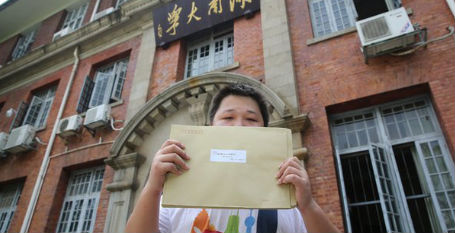This article was originally published on Gay Asia News (gayasianews.wordpress.com)
Xiang Xiaohan filed the lawsuit in the provincial capital, Changsha, after the Hunan government turned down his application to register his organization, reports bbc.com.
A copy of Hunan government’s reply to Xiang said same sex relations have no place in traditional Chinese culture.
“I believe what the government said [in the reply] defames the reputation of the gay and lesbian community in China, and I want them to issue a written apology,” said Xiang.
Xiang told bbc.com that the chance of the Hunan government backing down was slim, but he would not give up.
“The apology is not only for me, but for hundreds of thousands of gay men and women in China.”
“If gay and lesbian people have no place in China’s traditional culture, how can you encourage them to pursue the China Dream?” asks Xiang Xiaohan referring to President Xi Jinping’s publicly stated vision for the future of the country.
Xiang has since been dubbed China’s Don Quixote over his dogged determination to take the government to court.
His action is rare in a country where same sex relations was illegal until 1997 and defined as a mental disorder until 2001 and because it pushes the tolerance of the ruling Communist Party and the government to the limit, reports bbc.com.
Rarer still is the show of support from state-run Xinhua news agency, regarded as the mouthpiece of the government, which carried a detailed report about his campaign after he filed his defamation lawsuit against the Hunan government.
He also wants the government to reverse its decision not to register his organization.
In China, some NGOs already devote considerable resources to protecting gay rights but they do not openly operate in the name of the gay community. Xiang’s organization, if successfully registered as an NGO, would be the first of its kind in China.
Xiang’s defamation lawsuit was filed on February 19. Under current law, the court must inform the plaintiff within seven days whether it plans to proceed with the case. Xiang received a written reply from the court only on March 14, despite repeated requests for a response.
The court then threw out the case because it did not believe that the government defamed the gay and lesbian community, Xiang said, adding that he would appeal against the ruling.
His campaign may have seen him compared with the naive hero in Cervantes’ novel Don Quixote, but his protest has also highlighted the rising awareness of China’s gay community about their rights.
Yu Fang Qiang from Justice For All – a non-profit organization dedicated to safeguarding the rights of disadvantaged members of the public – said Xiang efforts mark a significant step forward by the government.
“It is the first time in China that a local government department has formally given a written reply to a request from the gay and lesbian community, whereas in the past the government would just simply ignore it,” he told bbc.com.
It is also rare that a court in China has dealt with Xiang’s lawsuit against Hunan government in an open and transparent way, Yu said.
“I’m confident that gays and lesbians will be fully accepted in China even though it may take 20, 30 or even 50 years for it to happen,” he added.

